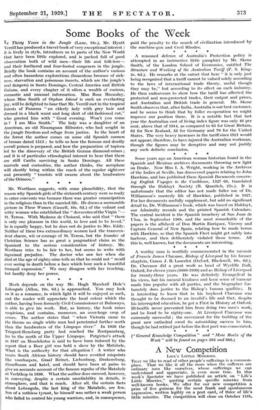Mr. Wortham suggests, with some plausibility, that the reason why
Spanish girls of the sixteenth century were so ready to enter convents was because there was greater emancipation in the religious than in the married life. He draws a memorable picture in Three Women (Cassell, 10s. 6d.) of the valiant and witty woman who established the " dovecotes of the Virgin "- St. Teresa. With Madame de Choiseul, who said that " there is only one pleasure in this world, to love and to be loved," he is equally happy, but he does not do justice to Mrs. Eddy. Neither of these two extraordinary women had the transcen- dent charm, wit or courage of St. Teresa, but the founder of Christian Science has as great a pragmatical claim as the Spaniard to the serious consideration of history. Mr. Wortham tries to be fair to her, but seems to write with ingrained prejudice. The doctor who saw her when she died at the age of eighty-nine tells us that he could not " recall ever seeing in death before a face which bore such a beautiful tranquil expression." We may disagree with her teaching, but hardly deny her power.
• * *












































 Previous page
Previous page